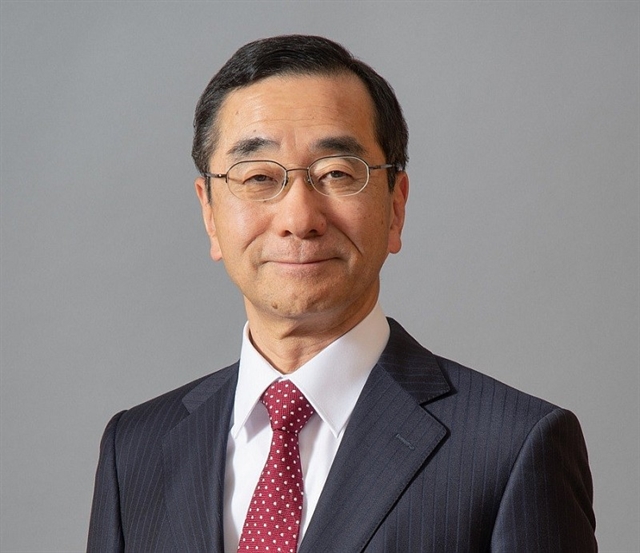[ad_1]

Nobuhiko Sasaki, Chairman and CEO of the Japan External Trade Organisation (JETRO), spoke to Thế giới & Việt Nam (The World and Việt Nam) online newspaper on the attraction of Việt Nam as a potential market that boasts many factors for steady growth in the eyes of Japanese investors.
Could you tell us about the economic and trade ties between Việt Nam and Japan and what is the key factor for the development of economic relations between the two countries in the future?
Trade and investment cooperation between Việt Nam and Japan has made much progress in recent years. Japan has poured a total investment capital of up to US$64.5 billion into 4,935 projects in Việt Nam.
Both Việt Nam and Japan are important trading partners of each other as Việt Nam is Japan’s third largest exports market and Japan is Việt Nam’s fourth largest export market.
People-to-people and business-to-business exchanges between the two sides are also taking place actively. There are about 450,000 Vietnamese people living and working in Japan, contributing a significant part to our country’s economy.
The number of Japanese companies expanding into Việt Nam has been increasing and the Japan Business Association in Việt Nam is now represented by about 2,000 Japanese enterprises.
The results of JETRO’s survey show that 55 per cent of Japanese companies operating in Việt Nam have business expansion plans in the next one or two years. This is the highest rate among Southeast Asian countries.
Japanese investors highly appreciate Việt Nam’s production and market potential. In my opinion, the two countries can build a relationship to complement each other’s strengths and weaknesses.
We are also considering boosting cooperation between the two countries in the field of innovation, which demand between the two sides is rapidly increasing.
What is your opinion about the world and Asian economic situation in the current context? What risks and challenges are Vietnamese and Japanese enterprises dealing with?
According to the latest global economic outlook released by the International Monetary Fund (IMF) on April 19, the world economic growth rate in 2022 and 2023 is forecast to be 3.6 per cent, a reduction of 0.8 and 0.2 per cent respectively compared to the previous forecast in January), mainly due to the tense situation of the Russia-Ukraine conflict.
Supply chain disruptions and labour shortages have affected the global inflation rate, which reached up to 7.4 per cent. Price hikes are also a factor hindering global economic growth.
The IMF has revised down its economic growth outlook for emerging Asian countries from 0.5 per cent, which would be 5.4 per cent in 2022.
Another disadvantage is the slowdown of the Chinese economy, which is the largest economy in the region. Although there are some unpredictable factors such as China’s decision to lock down many cities due to the spread of the COVID-19 pandemic, adapted economic activities will help recover the world economy.
However, direct trade between Russia and Ukraine is being limited, affected by soaring secondary commodity prices and reducing demand from major trading partners such as Europe.
At present, upward pressure on prices will be a bad influence on the world economy. Countermeasures to rising consumer prices, mainly in the US, are also believed to be a factor holding back consumption and investment.
Investments in the green and digital sectors are expected to increase. The gradual transition to a global carbon-free economy and investment in digital transformation is forecast to expand, opening up investment opportunities for businesses involved in this field.
What areas is JETRO focusing on in Việt Nam?
JETRO officially opened an office in Hà Nội in 1993 and another in HCM City in 2000. Việt Nam has received more and more attention and has become a favourite destination for Japanese manufacturing companies.
In Việt Nam, JETRO is currently implementing activities focusing on digital transformation, innovation, overseas investment of Japanese companies, foreign companies investment in Việt Nam, green economy, decarbonisation economy, agricultural and seafood export.
Japan is still affirming its position as one of the leading foreign investors (FDI) in Việt Nam. How do you forecast FDI flows from Japan to Việt Nam in the near future, especially after the visit of Prime Minister Kishida Fumio?
When surveying the business trends of Japanese enterprises and when asked if they have plans to expand investment in Việt Nam, up to half of the enterprises answered that they would. The reason given by Japanese investors is that Việt Nam is showing the attraction of a potential market with growth potential.
Japanese businesses wish to be able to use the abundant human resources of Việt Nam and develop further together with your country.
With such positive results, I expect FDI inflows from Japan to Việt Nam will increase in the future, especially after the visit of Prime Minister Kishida Fumio. — VNS
[ad_2]
Source link
